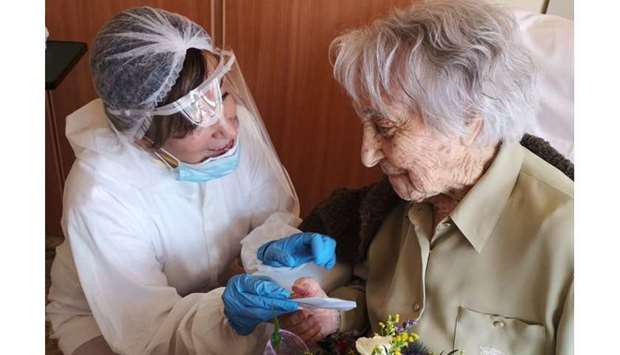“It will have to be done all over again and differently,” said Branyas, describing such a transformation as a debt owed to those who died in the pandemic. “Given my age, I likely won’t be there. But believe me a new order is needed.”
News that Branyas, Spain’s oldest living person, had survived the virus made headlines around the world last week, offering a moment of cheer from one of the world’s hardest-hit countries. Across Spain, the virus has claimed more than 27,500 lives.
Covid-19 began making its way through the yellow-painted hallways of Branyas’s care home in the city of Olot, some 70 miles north of Barcelona, in late March. Brushing aside their own fears and anxieties over the contagion, staff at the home continued to care for the residents. Still, the virus charted a deadly course, killing at least 17 of the 133 people living there.
Covid-19 left Branyas — who has lived through the 1918 flu, two world wars and Spain’s civil war — sick for just a handful of days. But she reeled from the deeper mark left by the pandemic, as it laid bare a society that, as she sees it, had pushed its elderly to the margins.
“This pandemic has revealed that older people are the forgotten ones of our society,” she said in an interview with the Observer, carried out with the help of one of her daughters. “They fought their whole lives, sacrificed time and their dreams for today’s quality of life. They didn’t deserve to leave the world in this way.”
The virus has charged through Spain’s more than 5,000 care homes, killing an estimated 17,500 residents. A similar story has played out across Europe with as many as half of all Covid-19 deaths believed to have taken place in care homes in Italy, France, Ireland and Belgium.
In Spain, where the reverence shown towards the elderly is a point of pride, the pandemic has forced a reckoning with an industry that has long fended off complaints of funding and staff shortages.
Before the pandemic, seniors had shared stories of waiting hours to go to the bathroom or receive a drink of water. Others had grappled with ant infestations or cockroaches, while staff at one home complained of being forced to ration essential items such as nappies and soap.
“This is the situation in our care homes — not during the pandemic but in the last decade,” Más Madrid politician Pablo Gómez Perpinyà told the regional assembly last month. “This is how our elderly have had to face the virus.”
The horrific situation came to light in March after the military was deployed to disinfect care homes. “The army found seniors who had been completely abandoned, some dead, in their beds,” the defence minister, Margarita Robles, told broadcaster Telecinco.
Prosecutors in Spain said this month that they had opened 140 investigations into care homes, prompted by complaints from family members and relatives. The Federación Empresarial de la Dependencia, an industry association that represents care homes in Spain, told Spanish broadcaster esRadio that homes had been left to care for residents after overwhelmed hospitals refused to take in more patients or to send care homes the appropriate medications.
Speaking from the care home where she has lived for nearly two decades, Branyas offered solutions. “It’s as though those of us who choose to live in a care home have disappeared from society,” she said. “Governments need to pay attention and provide funding and qualified staff in care homes. And, above all, they need to provide much more healthcare in homes.”
With the help of an account set up and run by her daughter, Branyas last year made her social media debut — her Twitter bio reads: “I’m old, very old, but not an idiot” — after she was recognised by the Gerontology Research Group as Spain’s oldest known living person and believed to be among the 30 oldest people in the world. Records kept by Club 110, a forum run by one of the group’s directors, suggest that Branyas is the world’s oldest Covid-19 survivor.
Born in 1907 in the United States, where her Spanish father was working as a journalist, Branyas moved to Spain in 1915. As the 1918 flu swept across the world, she was living on the outskirts of a small village in Catalonia, seemingly unaffected by the pandemic, said daughter Rosa Moret.
Her mother rarely speaks of the past, she added. “She says it’s better not to think about these things, you have to keep looking forward. I think that’s why she’s lived so long.”
Branyas was instead happier to outline the changes she hoped her 13 great-grandchildren would see in their lives. “A change in values, one that prioritises education, health and research,” she said. “And fewer weapons and far less spending on so many politicians.”
She laughed off a question over what comes next after fighting off the coronavirus. “Well, I’ll live,” she said. “Until God wants.” — Guardian/Observer News Service



